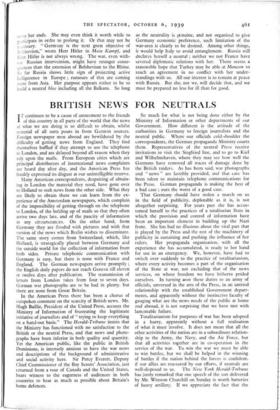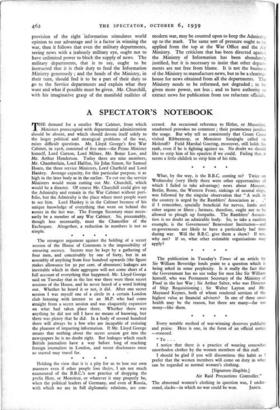BRITISH NEWS FOR NEUTRALS
Ir continues to be a cause of amazement to the friends of this country in all parts of the world that the news of what we are doing is so difficult to obtain, whilst material of all sorts pours in from German sources.
Foreign newspaper men abroad are bewildered by the difficulty of getting news from England. They find themselves baffled if they attempt to use the telephone to London, and are delayed beyond all reason when they rely upon the mails. From European cities which are principal distributors of international news complaints are heard day after day, and the American Press has frankly expressed its disgust at our unintelligible reserve.
Many American correspondents, despairing of obtain- ing in London the material they need, have gone over to Holland to seek news from the other side. What they are likely to obtain there we can learn from the ex- perience of the Amsterdam newspapers, which complain of the impossibility of getting through on the telephone to London, of the holding up of mails so that they often arrive two days late, and of the paucity of information in any circumstances. On the other hand, from Germany they are flooded with pictures and with that version of the news which Berlin wishes to disseminate. The same story comes from Switzerland, which, like Holland, is strategically placed between Germany and the outside world for the collection of information from both sides. Private telephonic communication with Germany is easy, but there is none with France and England. The German newspapers arrive promptly ; the English daily papers do not reach Geneva till eleven or twelve days after publication. The transmission of letters from London takes from four to seven days. German war photographs are to be had in plenty, but there are none from Great Britain.
In the American Press there has been a chorus of outspoken comment on the scarcity of British news. Mr.
Hugh Baillie, President of the United Press, accuses the Ministry of Information of frustrating the legitimate initiative of journalists and of " trying to keep everything on a hand-out basis." The Herald-Tribune insists that the Ministry has functioned with no satisfaction to the British or the neutral Press, and that news and photo- graphs have been inferior in both quality and quantity.
Yet the American public, like the public in British Dominions, is intensely anxious to have the war news and descriptions of the background of administrative and social activity here. Sir Percy Everett, Deputy Chief Commissioner of the Boy Scouts' Association, just returned from a tour of Canada and the United States, bears witness to the eagerness of audiences in both countries to hear as much as possible about Britain's home defences. So much for what is not being done either by the Ministry of Information or other departments of our Government. How different is the attitude of the authorities in Germany to foreign journalists and the neutral public. Where our officials cold-shoulder the correspondents, the German propaganda Ministry courts them. Representatives of the neutral Press receive invitations to visit the Siegfried line, and to go to Kiel and Wilhelmshaven, where they may see how well the Germans have removed all traces of damage done by the British raiders. As has been said, war photographs and " news " are lavishly provided, and that care has been taken to maintain telephone communications for the Press. German propaganda is making the best of a bad case ; ours the worst of a good case.
That Germany should have stolen a march on us in the field of publicity, deplorable as it is, is not altogether surprising. For years past she has accus- tomed herself to the practices of a totalitarian State in which the provision and control of information have been an important element in building up the Nazi front. She has had no illusions about the vital part that is played by the Press and the rest of the machinery of publicity in sustaining and pushing the influence of her rulers. Her propaganda organisation, with all the experience she has accumulated, is ready to her hand for use in an emergency. We, however, have had to switch over suddenly to the practice of totalitarianism, where every activity becomes a part of the organisation of the State at war, not excluding that of the news services, on whose freedom we have hitherto prided ourselves. In turning ever these duties to an army of officials, unversed in the arts of the Press, in an untried relationship with the established Government depart- ments, and apparently without the instinctive faculty of gauging what are the news needs of the public at home and abroad, it is not surprising that we have met with lamentable failure.
Totalitarianism for purposes of war has been adopted in a hurry, apparently without a full realisation of what it must involve. It does not mean that all the other activities of the nation are in a subordinate relation- ship to the Army, the Navy, and the Air Force, but that all activities together are in co-operation in the service of the war. To win the war we must be able to win battles, but we shall be helped in the winning of battles if the nation behind the forces is confident, if our allies are reassured by our efforts, if neutrals are well-disposed to us. The New York Herald-Tribune has justly remarked that one speech of the sort delivered by Mr. Winston Churchill on Sunday is worth batteries of heavy artillery. If we appreciate the fact that the provision of the right information stimulates world opinion to our advantage and is a factor in winning the war, then it follows that even the military departments, seeing news with a jealously military eye, ought not to have unlimited power to block the supply of news. The military departments, that is to say, ought to be instructed that it is their duty to feed the Information Ministry generously ; and the heads of the Ministry, in their turn, should feel it to be a part of their duty to go to the Service departments and explain what they want and what if possible must be given. Mr. Churchill, with his imaginative grasp of the manifold realities of modern war, may be counted upon to keep the Admiralty up to the mark. The same sort of pressure ought to be applied from the top at the War Office and the Air Ministry. The criticism that has been directed against the Ministry of Information has been abundantly justified, but it is necessary to insist that other depart- ments are not free from blame. It is not the business of the Ministry to manufacture news, but to be a clearing- house for news obtained from all the departments. The Ministry needs to be reformed, not degraded ; to be given more power, not less ; and to have authority to extract news for publication from too reluctant officials.



































 Previous page
Previous page